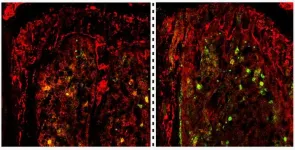(Press-News.org) Spectacles that are marketed to filter out blue light probably make no difference to eye strain caused by computer use or to sleep quality, according to a review of 17 randomised controlled trials of the best available evidence so far.
Nor did the review find any evidence that blue-light filtering lenses protect against damage to the retina, the light-sensitive tissue at the back of the eye, as included studies did not evaluate this outcome. Blue-light filtering lenses, also known as blue-light blocking spectacles, have been increasingly prescribed or recommended, often by optometrists, since the early 2000s.
The new review, published in the Cochrane Database of Systematic Reviews, was led by researchers at the University of Melbourne in collaboration with colleagues at City, University of London and Monash University.
The team set out to assess the effects of blue-light filtering lenses compared with non-blue-light filtering lenses for improving visual performance, providing protection to the retina and improving sleep quality. They analysed data from all the randomised controlled trials they could find on the topic and found 17 trials from six countries. The numbers of participants in individual studies ranged from five to 156, and the period of time over which the lenses were assessed ranged from less than one day to five weeks.
The senior author of the review is Associate Professor Laura Downie, Dame Kate Campbell Fellow and Head of the Downie Laboratory: Anterior Eye, Clinical Trials and Research Translation Unit, at the University of Melbourne, Victoria, Australia.
She said: “We found there may be no short-term advantages with using blue-light filtering spectacle lenses to reduce visual fatigue associated with computer use, compared to non-blue-light filtering lenses. It is also currently unclear whether these lenses affect vision quality or sleep-related outcomes, and no conclusions could be drawn about any potential effects on retinal health in the longer term. People should be aware of these findings when deciding whether to purchase these spectacles.”
However, the quality and duration of the studies also needs to be considered, she said.
“We performed the systematic review to Cochrane methodological standards to ensure the findings are robust. However, our certainty in the reported findings should be interpreted in the context of the quality of the available evidence. The short follow-up period also affected our ability to consider potential longer-term outcomes.”
The first author of the review, Dr Sumeer Singh, a postdoctoral research fellow in the Downie Laboratory, said: “High-quality, large clinical research studies with longer follow-up in more diverse populations are still required to ascertain more clearly the potential effects of blue-light filtering spectacle lenses on visual performance, sleep and eye health. They should examine whether efficacy and safety outcomes vary between different groups of people and using different types of lenses.”
The review did not find any consistent reports of adverse side effects from using blue-light filtering lenses. Any effects tended to be mild, infrequent and temporary. They included discomfort wearing the spectacles, headaches and lower mood. These were likely to be related to the wearing of spectacles generally, as similar effects were reported with non-blue-light filtering lenses.
Prof. Downie said: “Over the past few years, there has been substantial debate about whether blue-light filtering spectacle lenses have merit in ophthalmic practice. Research has shown that these lenses are frequently prescribed to patients in many parts of the world, and a range of marketing claims exist about their potential benefits, including that they may reduce eye strain associated with digital device use, improve sleep quality and protect the retina from light-induced damage. The outcomes of our review, based on the current, best available evidence, show that the evidence is inconclusive and uncertain for these claims. Our findings do not support the prescription of blue-light filtering lenses to the general population. These results are relevant to a broad range of stakeholders, including eye care professionals, patients, researchers and the broader community.”
The potential mechanisms by which blue-light filtering lenses might be able to help with eye strain, sleep and protecting the retina are unclear. One basis for claims about the benefits of these lenses is that modern digital devices such as computers and smart phones emit more blue light than traditional lighting sources, and are being used for longer, and closer to bedtime.
Dr Singh said: “The amount of blue light our eyes receive from artificial sources, such as computer screens, is about a thousandth of what we get from natural daylight. It’s also worth bearing in mind that blue-light filtering lenses typically filter out about 10-25% of blue light, depending on the specific product. Filtering out higher levels of blue light would require the lenses to have an obvious amber tint, which would have a substantial effect on colour perception.”
END
Blue-light filtering spectacles probably make no difference to eye strain, eye health or sleep quality
Spectacles that are marketed to filter out blue light probably make no difference to eye strain caused by computer use or to sleep quality, according to a new Cochrane review
2023-08-18
ELSE PRESS RELEASES FROM THIS DATE:
Demon Hunting: Physicists confirm 67-year-old prediction of massless, neutral composite particle
2023-08-18
In 1956, theoretical physicist David Pines predicted that electrons in a solid can do something strange. While they normally have a mass and an electric charge, Pines asserted that they can combine to form a composite particle that is massless, neutral, and does not interact with light. He called this particle a “demon.” Since then, it has been speculated to play an important role in the behaviors of a wide variety of metals. Unfortunately, the same properties that make it interesting have allowed it to elude detection since its prediction.
Now, a team of researchers led by Peter Abbamonte, a professor of physics at the University of Illinois Urbana-Champaign, ...
Stanford Medicine-led research identifies gene ‘fingerprint’ for brain aging
2023-08-18
Most of us who’ve reached middle age have noticed a slowing in memory and cognition, but scientists don’t have a clear picture of the molecular changes that take place in the brain to cause it.
Now, a study in mice has determined that the most pronounced changes occur in the white matter, a type of nervous system tissue that’s integral to transmitting signals across the brain. The study also examined two treatments — caloric restriction and infusions of plasma from young mice — that affect certain regions of the brain, with ...
Study observes sudden acceleration of flow, generates new boundary layer
2023-08-18
In an experiment on how turbulent boundary layers respond to acceleration in the flow around them, aerospace engineers at the University of Illinois Urbana-Champaign observed an unexpected internal boundary layer.
“Not only were we able to identify a new internal boundary layer, but we were able to systematically track its height so we can understand its growth rate. We also noticed that it only formed if our pressure grading, our acceleration, was sufficiently strong. There was a threshold under which we didn't ...
Being divorced and male among factors that increase risk of lower limb amputation among people with diabetes
2023-08-18
New research to be presented at this year’s Annual Meeting of the European Association for the Study of Diabetes (EASD) in Hamburg, Germany (2-6 October) shows that among people with type 1 and type 2 diabetes, being divorced is associated with a two-thirds higher risk of lower limb amputation (LLA) (amputations below the knee level) compared with being married, and being male is associated with a 57% higher risk of LLA compared with being female. The study is by Dr Stefan Jansson, Örebro University, Örebro, Sweden, and colleagues.
Deterioration in the structure of both large and ...
Researchers find walkable communities are healthier for both mom and baby
2023-08-17
DURHAM, N.H. — Pregnant women that live in walkable communities—with more sidewalks, parks and walking paths—not only engage in more physical activity but are also more likely to experience favorable birth outcomes, according to research from the University of New Hampshire.
The study, published in the journal of Economics and Human Biology, found that expectant mothers living in walkable counties tend to engage in more walking and exercise and have fewer issues with premature births, low birth weight, gestational diabetes and hypertension. Walking is often recommended as a safer, ...
Oregon State researchers develop novel technique for sniffing out toxic algae blooms
2023-08-17
Different cyanobacterial species produce different toxins, said OSU’s Kimberly Halsey, who led the study. Most of them cause gastrointestinal illness and acute skin rashes, and they can be deadly. In 2017, more than 30 cattle died after drinking contaminated water at Junipers Reservoir near Lakeview, Oregon, and blooms particularly pose a threat to dogs entering affected lakes.
Even though the research dealt with just one lake and one toxin, the research demonstrates VOCs’ potential in monitoring critical waterways, said Halsey, associate professor of microbiology in the College of Science.
She said the study published ...
New research: Political attitudes did not change during COVID-19 pandemic
2023-08-17
EAST LANSING, Mich. – There is a traditional understanding that if someone experiences a threatening event, their attitudes and beliefs will change. Some scholars predict that a threat will cause someone to become more conservative on a variety of issues or that they will become more extreme in their attitudes. However, a new study from researchers at Michigan State University and Tilburg University found that Americans’ political attitudes did not change significantly during the onset of the COVID-19 pandemic, contrary to ...
RESEARCH ALERT: City of Hope scientists unravel how TET2 gene deficiency fuels development of acute myeloid leukemia
2023-08-17
FINDINGS
Scientists at City of Hope, one of the largest cancer research and treatment organizations in the United States, have identified how low levels of the TET2 gene fuel the rapid growth of acute myeloid leukemia in animal models. Cell Stem Cell recently published the study.
A team led by Jianjun Chen, Ph.D., the Simms/Mann Family Foundation Chair in Systems Biology at Beckman Research Institute of City of Hope, found that TET2 deficiency sets off a cascade of biochemical changes that enhance the bone marrow cancer’s ability to spread. These changes ...
Sean Jones appointed Argonne’s Deputy Laboratory Director for Science and Technology
2023-08-17
The U.S. Department of Energy’s Argonne National Laboratory has named Sean Jones as deputy laboratory director for science and technology. Jones will begin his new role on October 9, serving as Argonne’s senior science strategist, advisor and chief research officer.
Jones will join Argonne from the National Science Foundation (NSF). In his current role as Assistant Director of the NSF’s Mathematical and Physical Sciences directorate, he oversees a $1.86 billion portfolio that includes five science divisions, domestic and international research facilities, and ...
Carrier receives International Award for Outstanding Leadership
2023-08-17
Julie Carrier, professor and head of the University of Tennessee Department of Biosystems Engineering and Soil Science, was awarded the James R. and Karen A. Gilley Academic Leadership Award during the annual international meeting of the American Society of Agricultural and Biological Engineers (ASABE) in July.
The award was given in recognition of Carrier’s exceptional leadership as department head as well as her ongoing dedication to furthering the UT Institute of Agriculture’s mission to provide research and extension ...
LAST 30 PRESS RELEASES:
Science reveals why you can’t resist a snack – even when you’re full
Kidney cancer study finds belzutifan plus pembrolizumab post-surgery helps patients at high risk for relapse stay cancer-free longer
Alkali cation effects in electrochemical carbon dioxide reduction
Test platforms for charging wireless cars now fit on a bench
$3 million NIH grant funds national study of Medicare Advantage’s benefit expansion into social supports
Amplified Sciences achieves CAP accreditation for cutting-edge diagnostic lab
Fred Hutch announces 12 recipients of the annual Harold M. Weintraub Graduate Student Award
Native forest litter helps rebuild soil life in post-mining landscapes
Mountain soils in arid regions may emit more greenhouse gas as climate shifts, new study finds
Pairing biochar with other soil amendments could unlock stronger gains in soil health
Why do we get a skip in our step when we’re happy? Thank dopamine
UC Irvine scientists uncover cellular mechanism behind muscle repair
Platform to map living brain noninvasively takes next big step
Stress-testing the Cascadia Subduction Zone reveals variability that could impact how earthquakes spread
We may be underestimating the true carbon cost of northern wildfires
Blood test predicts which bladder cancer patients may safely skip surgery
Kennesaw State's Vijay Anand honored as National Academy of Inventors Senior Member
Recovery from whaling reveals the role of age in Humpback reproduction
Can the canny tick help prevent disease like MS and cancer?
Newcomer children show lower rates of emergency department use for non‑urgent conditions, study finds
Cognitive and neuropsychiatric function in former American football players
From trash to climate tech: rubber gloves find new life as carbon capturers materials
A step towards needed treatments for hantaviruses in new molecular map
Boys are more motivated, while girls are more compassionate?
Study identifies opposing roles for IL6 and IL6R in long-term mortality
AI accurately spots medical disorder from privacy-conscious hand images
Transient Pauli blocking for broadband ultrafast optical switching
Political polarization can spur CO2 emissions, stymie climate action
Researchers develop new strategy for improving inverted perovskite solar cells
Yes! The role of YAP and CTGF as potential therapeutic targets for preventing severe liver disease
[Press-News.org] Blue-light filtering spectacles probably make no difference to eye strain, eye health or sleep qualitySpectacles that are marketed to filter out blue light probably make no difference to eye strain caused by computer use or to sleep quality, according to a new Cochrane review




